|
|
|
Sort Order |
|
|
|
Items / Page
|
|
|
|
|
|
|
| Srl | Item |
| 1 |
ID:
163285
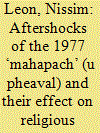

|
|
|
|
|
| Summary/Abstract |
The significance of the electoral ‘mahapach’ (upheaval) is not limited to the Likud’s rise to power in 1977 for the first time in Israel’s history. It also brought secondary upsets in the form of changes of guard among other political forces. This article focuses on three such ‘aftershocks’ which remoulded Israel’s religious political sphere: the metamorphoses in ethnic, Haredi and religious-Zionist politics. The political change of guard in each of these areas as a result of the mahapach boosted the power of religious forces, transforming them from marginal, largely reactive factors into active players with lasting impact on the moulding of Israeli society.
|
|
|
|
|
|
|
|
|
|
|
|
|
|
|
|
| 2 |
ID:
163290
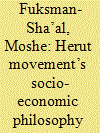

|
|
|
|
|
| Summary/Abstract |
This article examines the Herut movement’s social and economic alternative to the ruling Mapai party, characterised by a liberal-individualistic outlook and a general vision of converting the centralised economy to an economy in which private initiative and competition dominate. On 17 May 1977 the Herut movement became the ruling party through its Likud electoral bloc, with economic reforms quickly following. These reforms encountered difficulties: the declared ‘economic turnabout’ harmed the strength of the economy. Inflation rates reaching several hundred per cent, frequent devaluations, and a loss of faith in the Israeli currency threatened stability. Nevertheless, from the social perspective, Herut did indeed succeed in bettering the conditions of its loyal voters in the development towns and distressed neighbourhoods.
|
|
|
|
|
|
|
|
|
|
|
|
|
|
|
|
| 3 |
ID:
163294
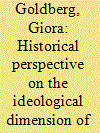

|
|
|
|
|
| Summary/Abstract |
This article argues that since 1977 policy changes of the new Likud government were small, but they engendered a tremendous shift in consciousness, as well as a symbolic change. Israel’s character as a Jewish state was greatly augmented. A new Israeli identity emerged, grounded primarily in Jewish roots with a preference for communal over state identity. Political ideologies in democracies are poor. The ‘iron law of ideology’ states that political parties, principally those that form governments, do not realise their ideological principles. The case of Herut, the maternal party of Likud, is a typical example of this law.
|
|
|
|
|
|
|
|
|
|
|
|
|
|
|
|
| 4 |
ID:
163286


|
|
|
|
|
| Summary/Abstract |
The article examines the impact of the 1977 political upheaval in Israel on the political direction of the Mafdal, the National Religious Party. The main argument is that, contrary to the widely held view, the party did not adopt more extreme national and social positions following the upheaval. As matter of fact, it was during the premiership of Prime Minister Menachem Begin that the Mafdal positioned itself as a moderate political party on foreign and defence issues. This was demonstrated in its stance in the face of several political and national events: its support of the peace agreement with Egypt, opposition to the bombing of the Iraqi nuclear reactor and reservations regarding deployment of the army during the Lebanon War. As a vital partner in Begin’s government after the upheaval, the Mafdal underwent a process of ‘co-optation’, one of the most powerful strategies for containing and subsuming opposing forces in contending with disagreement.
|
|
|
|
|
|
|
|
|
|
|
|
|
|
|
|
| 5 |
ID:
163291


|
|
|
|
|
| Summary/Abstract |
This article argues that the far-reaching changes in the jurisprudence of Israel’s Supreme Court during the 1980s and 1990s need to be understood in the context of the 1977 upheaval (or mahapach). This momentous event signalled the decline of the hegemony of the Labour movement that had led Israel for over four decades, as well as the resurgence of the ‘war of cultures’ (kulturkapmpf) that had been part of the history of the Jewish people since the rise of Jewish Enlightenment in the second half of the eighteenth century, namely the struggle between secular, pro-Western, liberal Jews and their religious counterparts over the nature and characteristics of Jewish public life. This article argues that the short time between the unprecedented developments in the jurisprudence of the Supreme Court and the mahapach invites an explanation that connects the two together.
|
|
|
|
|
|
|
|
|
|
|
|
|
|
|
|
| 6 |
ID:
163292
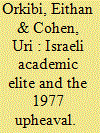

|
|
|
|
|
| Summary/Abstract |
This article analyses the reactions of Israel’s academic elite to the 1977 political upheaval. Some of Israel’s leading scholars in humanities and social sciences framed the new political situation as a grave ideological and moral crisis, reflecting the triumph of fundamentalist, nationalist, emotional and messianic trends over the rational, moderate, responsible political tradition that they had favoured and claimed to represent. The political change triggered a heated debate about the role of intellectuals in the ideological rehabilitation of the Labour party, as well as on the critical function of universities in the political arena. In the wake of what it perceived as a sharp deviation from the proper development of the traditional Zionist programme, the academic elite came to be perceived, in its own eyes as well as those of the public, as a faithful representative of the ‘old regime’, as an opponent to the new governmental elite and, for the first time, as an ideological opposition to Israel’s political hegemony.
|
|
|
|
|
|
|
|
|
|
|
|
|
|
|
|
| 7 |
ID:
163293
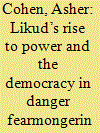

|
|
|
|
|
| Summary/Abstract |
The 1977 elections in Israel marked the first time since the country’s establishment in 1948 for a right-wing government to be elected. Immediately after this sea change, a ‘Democracy in Danger’ fearmongering discourse was instituted by representatives of academic, cultural, political and media elites. In fact, as this article shows, Likud’s ascendance served as a formative event of democratic transformation in the deepest sense of the word, strengthening and deepening Israel’s democratic identity that had hitherto been limited at most.
|
|
|
|
|
|
|
|
|
|
|
|
|
|
|
|
| 8 |
ID:
163283
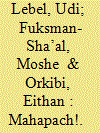

|
|
|
| 9 |
ID:
163288
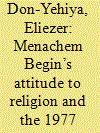

|
|
|
|
|
| Summary/Abstract |
The image of Herut as characterised by a strong linkage to Jewish religious tradition had a profound impact in the Israeli political arena. It motivated many of the religious and traditional public to support this party and later its successor, Likud. It also provided an incentive for the religious parties to join the government coalitions headed by Likud in the wake of the ‘political reversal’ of 1967. In this way, the public image of Likud as a ‘religious oriented party’ significantly contributed to the transformation of political power from Labour to Likud.
|
|
|
|
|
|
|
|
|
|
|
|
|
|
|
|
|
|
|
|
|